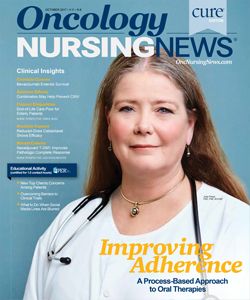Staying on Course: Nurses Have the Power Over Oral Adherence
Discoveries are made every day in the treatment of cancer. Fortunately, many are now in the form of oral drugs, which offer convenience to patients, who can take them from the comfort of their home instead of having to travel to a cancer center. But that easy accessibility comes with a cost: nonadherence.
Discoveries are made every day in the treatment of cancer. Fortunately, many are now in the form of oral drugs, which offer convenience to patients, who can take them from the comfort of their home instead of having to travel to a cancer center. But that easy accessibility comes with a cost: nonadherence.
Most recent data find nonadherence rates as high as 46%. Whether it be the price of a treatment, forgetfulness, or fear over potential adverse events, there are a number of reasons why patients may skip their medications.
In our cover story this month, Ellen Rice Tichich, MFA, MSN, RN-BC, discusses how to improve oral adherence—starting with nurses. She presents the basics of a process-based approach and speaks with Jody Pelusi, PhD, FNP, AOCNP, who has become a highly regarded expert in oral adherence.
Pelusi recognized the need for patient education, monitoring, and management when the first oral therapy was approved nearly 20 years ago. She created a 13-step drug management program— something that is just as important today. In this issue of Oncology Nursing News®, we examine the barriers to clinical trials. These are often faced by minorities and elderly patients and can give an inaccurate depiction of whether treatments, devices, or drugs affect some groups differently from how others do. Our feature shares how nurses can help the industry overcome this lack of diversity.
We also feature some everyday practical information on 2 gray areas: mentoring new oncology nurses and friending a patient on social media.
It may be difficult to think back to your first day on the job, but if you can picture it, think about what it was like. Perhaps overwhelming, chaotic, stressful, or even scary. However, leading by example and offering friendly advice to newcomers can give them the reassurance that is needed to fill such an important role.
Social media, like Facebook, Twitter, and Instagram, has become the norm in society. But is it ever OK to accept a friend request from a patient or to send one? Our second Professionally Speaking column addresses the blurred lines and advises fellow nurses on how to avoid any boundary crossings between professional and personal lives.
Also inside: the truth about how often vesicant extravasations occur, the potential risks of extended use of aromatase inhibitors, and the latest from the European Society for Medical Oncology 2017 Congress. We hope you find these articles informative, and as always, thank you for reading.
Mike Hennessy, SrChairman and CEO

Innovative Program Reduces Nurse Turnover and Fosters Development
Published: September 12th 2024 | Updated: September 12th 2024The US Oncology Network (The Network) has developed one of the most comprehensive programs in the nation to support the professional development and retention of new oncology nurses.


